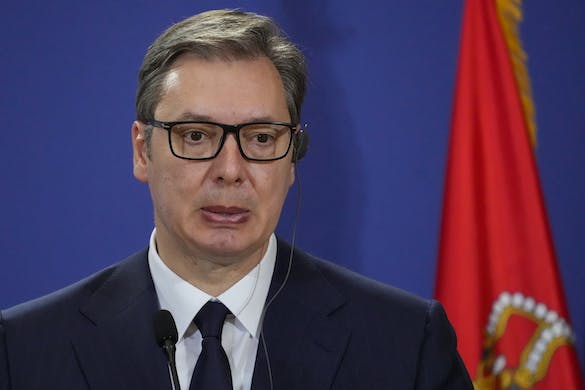Flames Doused in Kosovo, for Now, Serbia Quietly Pivots to Ukraine
Under increased Western pressure, Belgrade thumbs its nose at Moscow.

As the waves of violence that have swept over Kosovo in recents weeks start to retreat, something interesting has appeared in their wake: a robust Serbian swing toward support for Ukraine.
Serbia’s president, Aleksandar Vucic, has stated he is aware that some Serbian weapons “may end up in Ukraine” and that he does not intend to interrupt that unofficial flow. The admission signals a cold shoulder to Russia, traditionally an ally of Serbia.
It is a pivot that comes after Washington and the EU threw more support to Serbia than Kosovo in the recent flare-up of ethnic tensions in the Balkans.
That is all the more intriguing because Serbia does not formally recognize Kosovo’s independence (which was declared in 2008), and underscores just how much the center of political gravity in Europe has shifted to Ukraine and the places nearest to it. Kosovo, for all its powder keg potential in the past, is now clearly on the periphery of where the action is — and where the biggest threats to European security are.
Clashes erupted last month after ethnic Albanian candidates who were declared the winners of local elections in northern Kosovo entered municipal buildings to take office and were blocked by ethnic Serbs, who mostly boycotted the votes. Dozens of NATO troops, part of the Kosovo Force peacekeeping mission, as well as demonstrators were injured in the melees.
The Kosovo Force has nearly 3,800 troops. Following the violence, NATO announced it would send 700 additional troops to the area most impacted, namely northern Kosovo. About 500 of those reinforcements are slated to be members of Turkey’s 65th mechanized infantry brigade.
Amid the tensions, Washington brought pressure to bear on Kosovo. Late in May the American ambassador, Jeff Hovenier, went so far as to convey to Kosovo’s prime minister, Albin Kurti, that a NATO exercise planned for the region was canceled as a consequence of his inaction.
Mr. Kurti appears to be changing his tune. He has subsequently said that Kosovo will now consider holding new elections in four northern cities with majority Serb populations. And the ethnic Serb Srpska List Party said it would participate in fresh municipal elections that it essentially boycotted before, if the government withdraws special police units from northern Kosovo.
Those are largely internal dynamics. More significant in terms of global security is that Mr. Vucic met with President Zelensky in Moldova last month. That was a marked contrast to the stance of another central European leader, Hungary’s Viktor Orban, whose relationship with the Ukrainian leader is famously frosty.
While Serbia has condemned Russia’s invasion of Ukraine it remains opposed to imposing economic sanctions on Moscow.
Serbia applied for EU membership in 2009 — incidentally, the year after Kosovo declared independence from Serbia. But the pronounced drift away from Moscow now is notable.
Mr. Vucic told the Financial Times that he has not been in contact with the Kremlin for more than a year. Quarterly conversations with Vladimir Putin have ceased. He also said: “We join the ban on the re-export of, for example, dual-use technologies in drones…we will not be a hub for the re-export of anything to Russia.”
It has been some time since Serbia was in the news for its arms industry. As the Sun reported last year, a plane packed with Serbian-made weapons took off in July 2022 from the Serbian city of Nis, only to crash land in Greece. According to some reports there was a Next Generation Light Anti-tank Weapon in that cargo, though where it was headed is a mystery.
How many Serbian-made weapons or what kind will make it to Ukraine is not known, but as Kyiv’s counteroffensive looks set to take off whatever fresh ammunition that comes will certainly be welcomed. That this could cause some offense to President Putin seems not a worry. And Mr. Vucic, a former information minister to Slobodan Milosevic, has problems of his own.
In response to an American report that Serbian weapons are making their way to Ukraine through unnamed intermediaries, the Serbian president remarked to the Financial Times, “What is the alternative for us? Not to make them? Not to sell them?”
It would be ironic if the one thing that ends up keeping a lid on violence in the ever-fractious northern Balkans is the increasingly coordinated effort to crush the Russian war machine in Ukraine.

